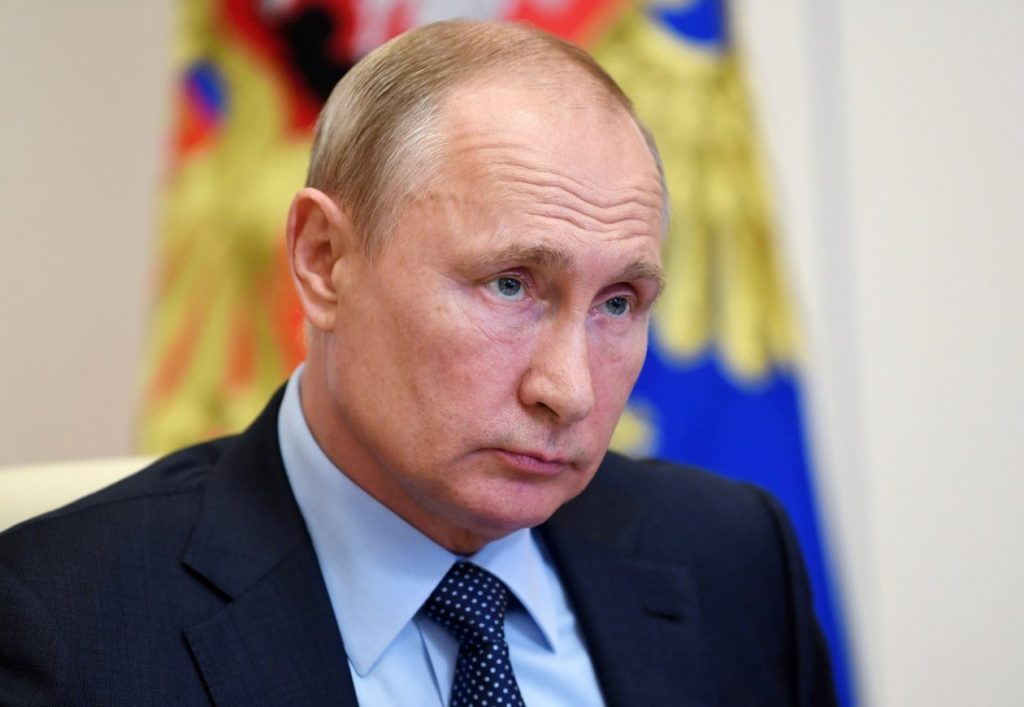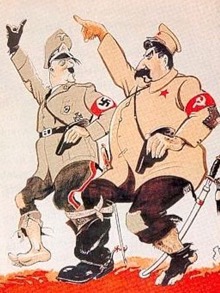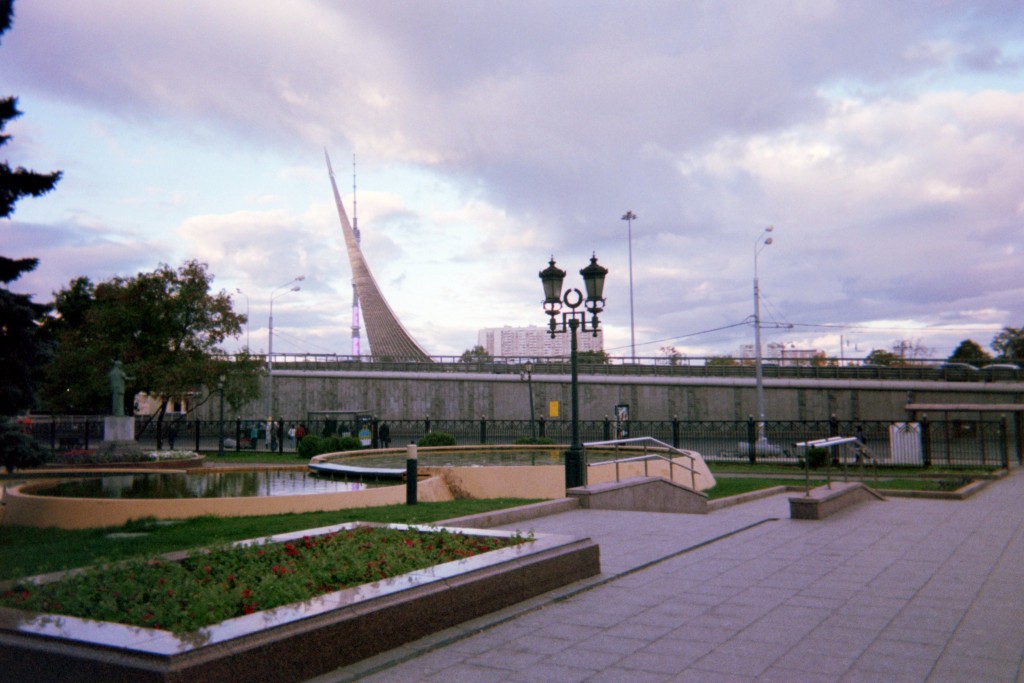
In a post last September, I wrote about how the EU had passed a resolution assigning equal blame to Nazi Germany and the Soviet Union for the start of WWII. I noted that in a pubic appearance at the time, Putin said that he’d be writing an article in the future about WWII addressing the inaccuracies reflected in the EU resolution:
This is the backdrop in which Putin recently announced that he is working with various archival documents and will write an article responding to the EU resolution and the historical inaccuracies that form its foundation.
Vladimir Putin’s article has just been published by The National Interest. The article discusses Word War II, the events leading up to the war, and the need to expand on the post-WWII world order to maintain peace and solve global problems. An excerpt is below. Feel free to discuss in the comments section.
The Real Lessons of the 75th Anniversary of World War II by Vladimir Putin
Seventy-five years have passed since the end of the Great Patriotic War. Several generations have grown up over the years. The political map of the planet has changed. The Soviet Union that claimed an epic, crushing victory over Nazism and saved the entire world is gone. Besides, the events of that war have long become a distant memory, even for its participants. So why does Russia celebrate the ninth of May as the biggest holiday? Why does life almost come to a halt on June 22? And why does one feel a lump rise in their throat?
They usually say that the war has left a deep imprint on every family’s history. Behind these words, there are fates of millions of people, their sufferings and the pain of loss. Behind these words, there is also the pride, the truth and the memory.
For my parents, the war meant the terrible ordeals of the Siege of Leningrad where my two-year-old brother Vitya died. It was the place where my mother miraculously managed to survive. My father, despite being exempt from active duty, volunteered to defend his hometown. He made the same decision as millions of Soviet citizens. He fought at the Nevsky Pyatachok bridgehead and was severely wounded. And the more years pass, the more I feel the need to talk to my parents and learn more about the war period of their lives. However, I no longer have the opportunity to do so. This is the reason why I treasure in my heart those conversations I had with my father and mother on this subject, as well as the little emotion they showed.
People of my age and I believe it is important that our children, grandchildren and great-grandchildren understand the torment and hardships their ancestors had to endure. They need to understand how their ancestors managed to persevere and win. Where did their sheer, unbending willpower that amazed and fascinated the whole world come from? Sure, they were defending their home, their children, loved ones and families. However, what they shared was the love for their homeland, their Motherland. That deep-seated, intimate feeling is fully reflected in the very essence of our nation and became one of the decisive factors in its heroic, sacrificial fight against the Nazis.
I often wonder: What would today’s generation do? How will it act when faced with a crisis situation? I see young doctors, nurses, sometimes fresh graduates that go to the “red zone” to save lives. I see our servicemen that fight international terrorism in the Northern Caucasus and fought to the bitter end in Syria. They are so young. Many servicemen who were part of the legendary, immortal 6th Paratroop Company were 19-20 years old. But all of them proved that they deserved to inherit the feat of the warriors of our homeland that defended it during the Great Patriotic War.
This is why I am confident that one of the characteristic features of the peoples of Russia is to fulfill their duty without feeling sorry for themselves when the circumstances so demand. Such values as selflessness, patriotism, love for their home, their family and Motherland remain fundamental and integral to the Russian society to this day. These values are, to a large extent, the backbone of our country’s sovereignty.
Nowadays, we have new traditions created by the people, such as the Immortal Regiment. This is the memory march that symbolizes our gratitude, as well as the living connection and the blood ties between generations. Millions of people come out to the streets carrying the photographs of their relatives that defended their Motherland and defeated the Nazis. This means that their lives, their ordeals and sacrifices, as well as the Victory that they left to us will never be forgotten.
We have a responsibility to our past and our future to do our utmost to prevent those horrible tragedies from happening ever again. Hence, I was compelled to come out with an article about World War II and the Great Patriotic War. I have discussed this idea on several occasions with world leaders, and they have showed their support. At the summit of CIS leaders held at the end of last year, we all agreed on one thing: it is essential to pass on to future generations the memory of the fact that the Nazis were defeated first and foremost by the Soviet people and that representatives of all republics of the Soviet Union fought side by side together in that heroic battle, both on the frontlines and in the rear. During that summit, I also talked with my counterparts about the challenging pre-war period.
That conversation caused a stir in Europe and the world. It means that it is indeed high time that we revisited the lessons of the past. At the same time, there were many emotional outbursts, poorly disguised insecurities and loud accusations that followed. Acting out of habit, certain politicians rushed to claim that Russia was trying to rewrite history. However, they failed to rebut a single fact or refute a single argument. It is indeed difficult, if not impossible, to argue with the original documents that, by the way, can be found not only in the Russian, but also in the foreign archives.
Thus, there is a need to further examine the reasons that caused the world war and reflect on its complicated events, tragedies and victories, as well as its lessons, both for our country and the entire world. And like I said, it is crucial to rely exclusively on archive documents and contemporary evidence while avoiding any ideological or politicized speculations.
I would like to once again recall the obvious fact. The root causes of World War II mainly stem from the decisions made after World War I. The Treaty of Versailles became a symbol of grave injustice for Germany. It basically implied that the country was to be robbed, being forced to pay enormous reparations to the Western allies that drained its economy. French marshal Ferdinand Foch who served as the Supreme Allied Commander gave a prophetic description of that Treaty: “This is not peace. It is an armistice for twenty years.”
It was the national humiliation that became a fertile ground for radical sentiments of revenge in Germany. The Nazis skillfully played on people’s emotions and built their propaganda promising to deliver Germany from the “legacy of Versailles” and restore the country to its former power while essentially pushing German people into war. Paradoxically, the Western states, particularly the United Kingdom and the United States, directly or indirectly contributed to this. Their financial and industrial enterprises actively invested in German factories and plants manufacturing military products. Besides, many people in the aristocracy and political establishment supported radical, far-right and nationalist movements that were on the rise both in Germany and in Europe.
The “Versailles world order” caused numerous implicit controversies and apparent conflicts. They revolved around the borders of new European states randomly set by the victors in World War I. That boundary delimitation was almost immediately followed by territorial disputes and mutual claims that turned into “time bombs”.
One of the major outcomes of World War I was the establishment of the League of Nations. There were high expectations for that international organization to ensure lasting peace and collective security. It was a progressive idea that, if followed through consistently, could actually prevent the horrors of a global war from happening again.
However, the League of Nations dominated by the victorious powers of France and the United Kingdom proved ineffective and just got swamped by pointless discussions. The League of Nations and the European continent in general turned a deaf ear to the repeated calls of the Soviet Union to establish an equitable collective security system, and sign an Eastern European pact and a Pacific pact to prevent aggression. These proposals were disregarded.
The League of Nations also failed to prevent conflicts in various parts of the world, such as the attack of Italy on Ethiopia, the civil war in Spain, the Japanese aggression against China and the Anschluss of Austria. Furthermore, in case of the Munich Betrayal that, in addition to Hitler and Mussolini, involved British and French leaders, Czechoslovakia was taken apart with the full approval of the League of Nations. I would like to point out in this regard that, unlike many other European leaders of that time, Stalin did not disgrace himself by meeting with Hitler who was known among the Western nations as quite a reputable politician and was a welcome guest in the European capitals.
Poland was also engaged in the partition of Czechoslovakia along with Germany. They decided together in advance who would get what Czechoslovak territories. On September 20, 1938, Polish Ambassador to Germany Józef Lipski reported to Minister of Foreign Affairs of Poland Józef Beck on the following assurances made by Hitler: “…in case of a conflict between Poland and Czechoslovakia over our interests in Teschen, the Reich would stand by Poland.” The Nazi leader even prompted and advised that Poland started to act “only after the Germans occupy the Sudetes.”
Continue reading here.

